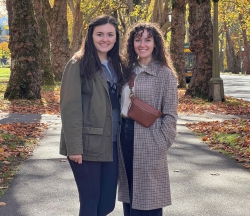The Ballard Center and Careers in Social Impact Consulting
PROVO, Utah – Nov 18, 2021 – Do you want to work in a consulting firm but don’t know how or where to start? BYU Marriott School of Business 2020 MPA graduate Alyssa Clark and BYU 2020 political science graduate Jennica Collette share how the skills they learned during their time at the Ballard Center for Social Impact helped them transition into social impact consulting.
Clark and Collete currently work as business analysts at Cicero Group, a data-driven management consulting agency located in Salt Lake City. The two of them have known and worked with each other for a number of years, beginning when they were students at BYU. They jokingly describe their résumé experience as “basically the same.”
During their time at BYU, Clark and Collete collectively participated in a variety of programs hosted by the Ballard Center, including as project leads for social impact projects (SIP), in research and writing roles for the Ballard Brief team, as participants for in the annual social impact story competition Y-Prize Ballard Stories, and as Ballard Center employees. In addition to being friends, the two also share an interest in solving refugee crises and working together to address what they can in their roles.
Having spent the last year in these full-time positions, the two have come up with four ways to help students follow in their footsteps and prepare for their own careers in social impact consulting.
Learn to Build Partner Relationships
Both women agree that consulting of any kind significantly impacts customer relations. Clark shares that she gained valuable and relevant experience on this topic from her SIP class. “Students in the SIP class get to manage partner relationships with many great organizations using consulting elements,” she says.
Clark continues by sharing that students in SIP are strategically placed in teams to help highly vetted partners solve social problems. “In these projects, students are challenged to deliver professional-quality work in a short time frame,” she says. “SIP help students focus on overdelivering, being autonomous and becoming more creative with solutions.” She also shares that getting this hands-on experience while being a student provides an excellent opportunity to “consult” even before landing a job after graduation.
Develop Research Skills
Ballard Center director Todd Manwaring explains that research is a key element to social impact work and consulting. Manwaring is well-known around the Ballard Center for saying the phrase, “Fall in love with the problem, not the solution.” Various Ballard Center classes help prepare students with skills to conduct primary and secondary research, human-centered design, and ongoing evaluation research to get to beyond surface level solutions and to the real root of the problem.
As social impact consultants, Collete and Clark have maintained an interest in the research skills they each gained while working at the Ballard Center. The tools they learned as students have played a big role in their current positions and has helped them to now conduct in-depth research for their clients. “Both Jennica and I have the opportunity to do a lot of secondary and primary research in our roles,” says Clark. “The research we both do is rigorous.”
Collete explains, “In my full-time role, I’ve been able to do a lot of strategy-focused work,” she continues. “I’d say that about 60 percent of my work is focused on the strategy, and the other 40 percent is focused on synthesizing primary and secondary research.”
Practice Flexibility
When asked what a typical day looks like for a social impact consultant, Collete and Clark both agree that no two days are alike. “We work on things such as researching issues, identifying problems, and presenting findings to a project lead, and then working to create narratives and proposals for those issues,” Clark says. She notes that constant change and rigorous demands are almost a guarantee in social impact consulting.
Clark adds that having a big picture perspective is important. “Something important to know is what options and preferences are available to you as a consultant,” she says. “Consulting can be fun and exciting because you get to work on a variety of projects and possibly travel to new places, but that may not always be the case. Being flexible is an important character trait in a job like this.”
Learn about Human-Centered Design
“The skills the Ballard Center can teach you are amazing,” Clark says, “especially the skill of knowing how to tell a powerful narrative and understanding how to implement human-centered design.” The Ballard Center teaches students how to solve problems by helping people solve their own problems. Collete explains that human-centered design focuses on helping people solve their own problems and inviting those suffering to be participants in the ideation, creation, implementation and testing of solutions.
When students are finally ready to move beyond the Ballard Center, Clark believes students will graduate with important skills that may not be listed on a job description. “My experience with SIP, the Ballard Brief team, and the collaboration I had with those in the Ballard Center helps me in my day-to-day work,” Clark says. “The Ballard Center is the greatest place to expand your skill set with what’s necessary to be successful in a social impact consulting setting.”
Media Contact: Alicia Gettys 801-422-9009
Writer: Alexa Ballard




